5 August, 2003
A well-run school is not unlike a ship where everyone and everything
clicks just right. The Research Vessel Nathaniel B. Palmer is just
such a ship. After 20 years of teaching I know something about
schools, and so by extension, I believe I can speak for the smooth
operation of the ship even though I have never been to sea. Simply
put, it's all about professionalism.
In a school, for example, it all starts with the administrators and
teachers. If they don't take things seriously, students will follow
suit, and soon it all goes down from there. On the Palmer, however,
there is little doubt that Captain Joe Borkowski and his officers set
the proper tone. Their upbeat manner and positive approach is
infectious, so no matter what the crew is doing (and they are always
doing something), everyone is quick to offer a friendly greeting and
I often hear laughter as they attend to their duties. The same holds
true for educators. Each principal may be seen as the captain of the
school while the teachers could be their officers. If these
classroom and school leaders are enthusiastic about what they are
doing, the students will be too, and therefore learning gets done.
When I happened to mention to Captain Joe the other day how much I
appreciated being on the Palmer, he was quick to give credit to his
officers and crew. Whereas other ships' crews are competent, the
Palmer's excels largely because there are few ships with as an
experienced and well-trained crew as found here on this icebreaker.
"It's the crew that makes it work," the Captain proudly stated.
Another officer observed that the ship "almost runs itself" because
of the experience of so many of the crew.
And everything works all the time. If you ever had an old car that
was less than reliable, then you probably know how frustrating - or
even dangerous - it is to be stranded somewhere in a broken-down
vehicle. The only thing that I have even heard about is the
occasional stopped-up toilet, or head, in ship talk. But with one
quick call, an engineer takes care of it in a matter of minutes. The
Palmer may also be the cleanest ship afloat. Every day of the week,
members of the crew are scrubbing floors, washing walls and ceilings,
or painting various parts of the ship. A well-maintained ship goes a
long way to contributing to the overall efficiency of its operations,
and it should come as no surprise, that it is the same for a
well-maintained school.
Perhaps what I like most about the Palmer, however, is that I feel
safe. Having never really been out to sea, I must admit that I was
somewhat uneasy about being on a cruise this long in potentially
harsh Arctic conditions. Navigating the ice and fog is not for the
faint of heart. The crashing and grinding felt and heard when we are
breaking ice conjures-up images of ships sunk by icebergs. But after
spending some time up on the bridge and the decks below observing the
officers and crew in action, all anxiety melts away even though the
ice hasn't.
I suspect that the crew of the Palmer is similar to a group of expert
teachers. You may get the idea that teaching is easy, for example,
from watching an experienced educator who knows what they are doing
with students. Observe a beginning teacher for a while with the same
bunch of students and you quickly learn otherwise. The Palmer’s
officers and crew simply make it look easy because they are so good
and conscientious at what they do - just like a well - run school.
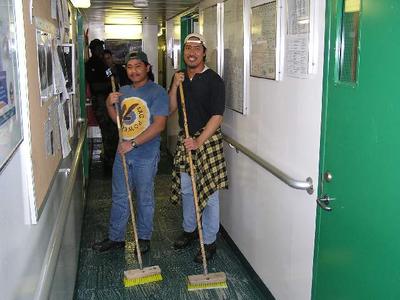
Crewman/Winch Operator Ric Tamayo (left) and Crewman Lorenzo Sandoval.
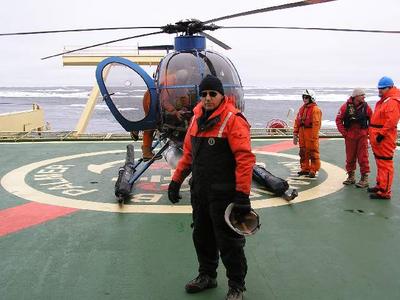
Crewman Marcelo Mera in firecrew gear.
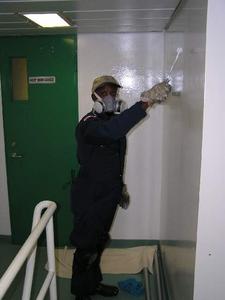
Crewman Ron Mack.
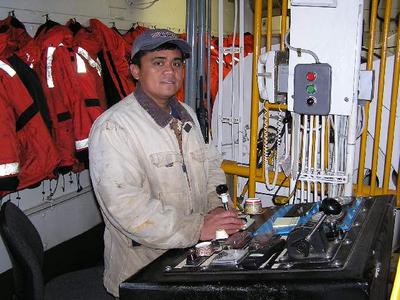
Crewman/Winch Operator Danilo (Danny) Plaza.
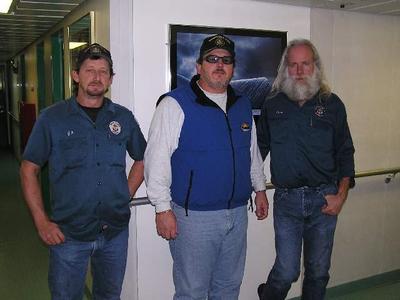
The Pros: Captain Joe Borkowski (middle) with his Chief Engineers Johnny "JP" Pierce (left) and Dave Munroe (right).
Contact the TEA in the field at
.
If you cannot connect through your browser, copy the
TEA's e-mail address in the "To:" line of
your favorite e-mail package.
|
